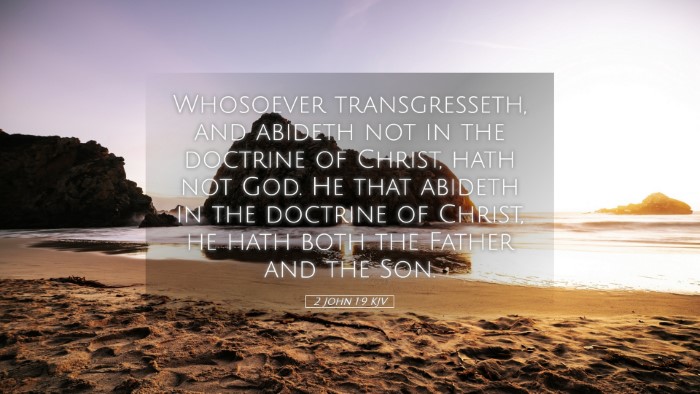Commentary on 2 John 1:9
2 John 1:9 reads, "Whosoever transgresseth, and abideth not in the doctrine of Christ, hath not God: he that abideth in the doctrine of Christ, he hath both the Father and the Son." This verse serves as a crucial point of reflection for believers regarding the importance of adhering to the doctrine of Christ. It invites a thorough exploration of John’s message and the implications for the Christian faith.
General Context
In this short epistle, John emphasizes the vital relationship between love, truth, and adherence to sound doctrine. The letter is addressed to a chosen lady and her children, commonly interpreted as a metaphor for the church and Christians throughout history.
Exegetical Insights
John presents two significant statements that highlight the essentials of the Christian faith.
- The Danger of Transgression: The term "transgresseth" denotes a willful departure from the teachings of Christ. Matthew Henry elucidates that it signifies not merely error but a fundamental deviation from the truth.
- The Assurance of Abiding: To "abide in the doctrine of Christ" suggests a continuous and committed engagement with the teachings of Jesus, a theme echoed throughout the Apostolic letters. Albert Barnes emphasizes that abiding in Christ assures believers of their relationship with God.
Theological Implications
This verse encapsulates a critical theological assertion: the necessity of fidelity to the doctrine of Christ as a measure of one’s relationship with God. Adam Clarke comments on the significant dichotomy presented: those who abandon doctrine distance themselves from God while those who remain in it enjoy communion with the Father and Son.
1. The Nature of Truth
The doctrine of Christ encompasses the full revelation of His person and work. It is the foundation upon which the church stands. Henry notes the importance of recognizing that Christ’s doctrine is not merely a set of teachings; it embodies the truth of God’s revelation.
2. The Relationship between Doctrine and Experience
John draws a direct correlation between doctrine and the spiritual experience of believers. To reject doctrinal truth, according to Barnes, is to forfeit the spiritual life centered in God. Conversely, those who adhere to His teachings secure their relationship with both the Father and the Son.
3. The Warning to Believers
John’s epistle serves as a caution to the church against false teachings and to emphasize the necessity of discernment. Clarke warns that those who would lead others astray delve into the realm of spiritual danger, illustrating the urgency with which believers are to pursue truth.
Practical Applications
This verse speaks directly to the Christian life and the importance of doctrinal integrity.
- Discernment in Sound Doctrine: Pastors and church leaders must prioritize teaching that aligns with scriptural truths. The church is called to be vigilant against teachings that distort or dilute the gospel.
- Encouragement of Unity in Truth: Believers are encouraged to unite under the banner of Christ’s teachings, fostering a community that thrives on scriptural fidelity and mutual edification.
- Personal Reflection: Students and scholars should reflect on their own adherence to the doctrine of Christ, ensuring that their beliefs and practices remain in line with biblical teachings.
Conclusion
In essence, 2 John 1:9 serves as both a warning and an encouragement. It calls individuals to remain steadfast in the truth of Christ’s teachings while also assuring them of the richness of relationship found in adhering to these doctrines. The multifaceted insights from Henry, Barnes, and Clarke collectively underscore this weighty message: in maintaining fidelity to the doctrine of Christ, believers experience the fullness of their communion with God.


